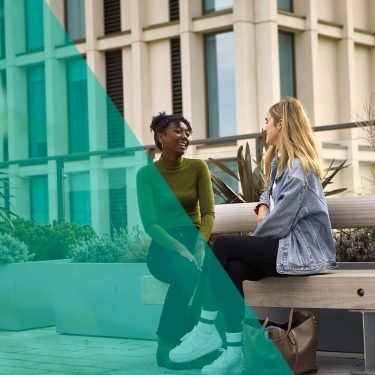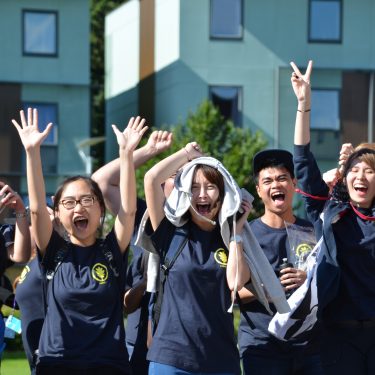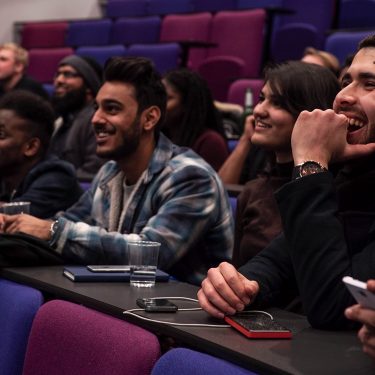This blog has been contributed by Emma Tonkin, Marketing Manager at Unifrog. Unifrog’s report – “One Year On”, can be viewed here.
The ongoing work by the UPP Foundation Student Futures Commission has shone a light on how university students feel about the ‘new normal’ on campus. But how do prospective students – those currently at school – feel about the changes to higher education, and how can we best support them as they transition from school to university? Unifrog – a social enterprise working to level the playing field when it comes to students finding and applying successfully for their next steps – has surveyed over 15,000 school children at four key touch points over the past year to gain valuable insights into the impact of the pandemic and how we can help students to move forward positively.
Record applications look set to continue
Unifrog’s survey data suggests the current boom in university applications will continue, with over three quarters of the Year 12 students surveyed (78%) saying they plan on applying to university. Encouragingly, the pandemic hasn’t dented the upward trend on the Unifrog platform in students from state schools and disadvantaged backgrounds (those from POLAR4 quintiles 1 and 2) becoming increasingly aspirational in their university research. The proportion of state and disadvantaged students predicted to get 3Bs or higher at A-level who shortlisted a Russell Group university has risen steadily over the past three years while the proportion of independent school students has remained steady. The same trend was visible among students predicted to get 3As or higher who shortlisted an Oxbridge course.
While the numbers are moving in the right direction, research from the Education Policy Institute (EPI) and Department for Education has shown that disadvantaged students are more likely to have experienced significant disruption to their education during the pandemic and may therefore need more support to realise these aspirations, as well as when they get to university.
It’s also important to make sure that younger students are aware of contextual offers and what they could mean for them via outreach programmes from the outset of their university research to raise awareness of the many opportunities available and help to boost aspirations.
Students feel unprepared for university
Almost half of the students surveyed (46%) say they feel unprepared for the prospect of going to university, suggesting that more can be done to ease the transition from school to university and help students feel ready. These students have shown their resilience throughout the pandemic and have adapted seamlessly to online and independent learning, key skills that will serve them well at university – they may just need reminding of this!
Social distancing restrictions seem to be contributing to students’ concerns about starting university. 57% are concerned about the impact of social distancing on their course, and 65% about its impact on making friends. Hopefully with restrictions easing, we’ll start to see students becoming more confident about the start of term in the autumn. Any information about what social distancing guidelines will look like on campus, and during Freshers’ Week, may help to alleviate students’ concerns.
Demand for in-person experiences
After experiencing online teaching at school for much of the past 15 months, Unifrog’s most recent survey of 4,500+ school students found that in-person teaching is a priority when choosing a university. To emphasise just how strongly students feel about this, 55% said they definitely wouldn’t apply to a university offering online teaching only.
While the Student Futures Commission’s work has shown that university students value many aspects of online teaching, it’s clear these benefits haven’t filtered down to incoming cohorts. Helping students to understand the positives of a blended model of teaching may help them to make more informed decisions when choosing between courses and universities, as well as to feel more comfortable if they’re due to start at an institution where some teaching will still be online in the autumn.
Open to open days
Students are also desperate to see a return to in-person open days, with a huge 86% of students keen to attend an in-person university open day if one was on offer. When asked why they’re so keen to attend in person, almost all the respondents (94%) cited getting a feel for the university as important while 71% also said they wanted to see the town or city where the university was based – two aspects it’s virtually impossible to recreate online.
As many students starting university this autumn will have missed out on the chance to get a feel for the university and the place where they’ll be living, it’s likely they’ll feel apprehensive about the start of term and may need more support to settle in than in previous years.
One way to help students get a feel for the university is to give them the chance to hear from current students. These personal experiences can go a long way to help students feel as though they’ve had an authentic viewpoint shared with them and feel more in touch with where they’ll be living come September.
The impact on motivation
The last few months have been exceptionally difficult for young people – both at school and at university. Unifrog have found that the negative impact on students’ motivation has become more pronounced as the pandemic has gone on. The proportion of students who believe that the pandemic has had a negative effect on their motivation to study and do well has increased steadily over the past year. When we first surveyed students at the start of the pandemic, 49% of students reported that their motivation had been negatively impacted. One year later, this has risen to 67%.
With this in mind, it’s vital that when students start in September, universities are ready to re-engage them from day one and boost motivation to get them excited about learning again.
High levels of support
Throughout the pandemic, teacher support has consistently been a protective factor for students’ motivation. Regardless of age or gender, students who feel as though they have good levels of support from their teachers are less likely to report that the pandemic has had a negative impact on their motivation.
Reassuringly two thirds (66%) of students in April 2021 felt as though they had good levels of support from their teachers. Only 13% didn’t feel they had good levels of support, and a further 21% weren’t sure.
As many students are now used to this high level of support, and we’ve seen its impact on motivation levels over the past 16 months, the shift to university and reduced contact time may need to be managed more carefully than in previous years. First year students may need increased one-on-one support – even if virtual – to help them transition successfully. It will also be important for university staff to monitor students and be ready to identify those who seem to be struggling with the reduction in support and work with them to feel more comfortable with the more independent university teaching style.
This piece is part of the ongoing series of blogs and case studies that we will be publishing over the next few months. It represents the views of the author, and is part of the broad conversation the Student Futures Commission is facilitating.







